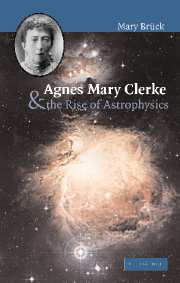Book contents
- Frontmatter
- Contents
- Acknowledgements
- Introduction
- 1 Family background in County Cork
- 2 Ireland and Italy
- 3 London, the literary scene
- 4 The History of Astronomy
- 5 A circle of astronomers
- 6 A visit to South Africa
- 7 The System of the Stars
- 8 Social life in scientific circles
- 9 Homer, the Herschels and a revised History
- 10 The opinion moulder
- 11 Popularisation, cryogenics and evolution
- 12 Problems in Astrophysics
- 13 Women in astronomy in Britain in Agnes Clerke's time
- 14 Revised System of the Stars
- 15 Cosmogonies, cosmology and Nature's spiritual clues
- 16 Last days and retrospect
- 17 Epilogue
- Notes
- Appendix
- Bibliography
- Index
13 - Women in astronomy in Britain in Agnes Clerke's time
Published online by Cambridge University Press: 14 August 2009
- Frontmatter
- Contents
- Acknowledgements
- Introduction
- 1 Family background in County Cork
- 2 Ireland and Italy
- 3 London, the literary scene
- 4 The History of Astronomy
- 5 A circle of astronomers
- 6 A visit to South Africa
- 7 The System of the Stars
- 8 Social life in scientific circles
- 9 Homer, the Herschels and a revised History
- 10 The opinion moulder
- 11 Popularisation, cryogenics and evolution
- 12 Problems in Astrophysics
- 13 Women in astronomy in Britain in Agnes Clerke's time
- 14 Revised System of the Stars
- 15 Cosmogonies, cosmology and Nature's spiritual clues
- 16 Last days and retrospect
- 17 Epilogue
- Notes
- Appendix
- Bibliography
- Index
Summary
The world scene
The election of Agnes Clerke and Margaret Huggins to the Royal Astronomical Society, almost 70 years after their only two predecessors were similarly honoured, would appear to indicate that women played a very small role in astronomy in nineteenth century Britain. That indeed was the case. An international register compiled early in the new century listed all observatories, astronomers and their instruments operating world-wide at that time. It showed that those engaged in astronomy or allied fields (geophysics, navigation, meteorology) in institutions throughout the entire world numbered fewer than a thousand. In Britain, the number of people in permanent paid posts in astronomy barely exceeded 100, of whom half were computers.
A conspicuous aspect of these statistics relates to the position of women. The United States, in contrast to all other countries, employed women on the staff of their observatories for astronomical research. They were part of the accepted scheme of things. Nineteen names of members of the well-established women's team of spectroscopists and photometrists at Harvard are recorded. Each of the four all-women colleges in the United States also had two or three female astronomers on its academic staff, while a few further women were employed as computers at other institutions. The grand total was fifty.
The history of the Harvard scheme, which started in 1875, has been told many times. Though the women were not highly ranked nor well paid, they were doing cutting-edge research and constantly making discoveries in the fast-growing field of astrophysics.
- Type
- Chapter
- Information
- Agnes Mary Clerke and the Rise of Astrophysics , pp. 175 - 188Publisher: Cambridge University PressPrint publication year: 2002



